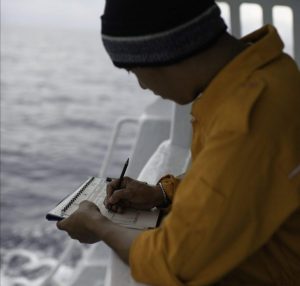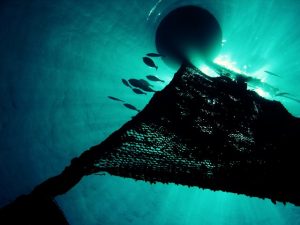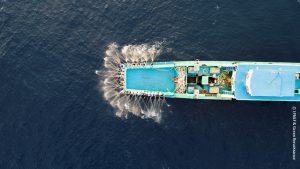 IPNLF POSITION STATEMENT
IPNLF POSITION STATEMENT
18th Regular Session of the
Western and Central Pacific Fisheries Commission
01-07 December 2021, online
The International Pole & Line Foundation (IPNLF) is a global charity that promotes the effective management of tuna stocks, safeguarding the livelihoods they support. IPNLF promotes sustainable development through responsible use of the marine environment and the empowerment of local coastal communities to conserve biodiversity, safeguard food security, support their livelihoods, build climate resilience and eradicate poverty. IPNLF’s mission is to empower responsible fisheries, which give back to the seas and the people that depend on them. We work across science, policy and the seafood supply chain to achieve this.
The Western and Central Pacific Ocean region is home to the world’s largest tuna fishery, two of the world’s largest pole-and-line fisheries, and many troll and handline fisheries supporting coastal communities throughout the region. IPNLF would like to see management measures adopted that safeguard tuna stocks and ecosystems so that one-by-one tuna fisheries, and the communities that depend on them, can flourish.
Despite the unusual circumstances of this year’s meeting, IPNLF encourages members, cooperating non-members and participating territories (CCMs collectively) to adopt a number of conservation and management measures (CMMs) that, together, will strengthen the framework for sustainable tuna fisheries in the Western and Central Pacific Ocean. Specifically, we urge progress in the following areas:
Adopt CMMs that safeguard ALL workers at sea, explicitly including onboard observers and fishing crews.
Forced labor, traffic in persons, bonded labor, human rights abuses, crew abandonment, and unpaid wages are still prevalent among vessels operating within the Commission’s area of competence, especially among distant water fishing vessels that employ migrant workers. IPNLF respectfully requests the Commission to expedite the approval and implementation of proposed CMM on Safety & Security for Crew on Fishing Vessels, proposed by Indonesia and New Zealand. Authorities that register vessels to fly their flag in the Commission area should ensure adequate measures are put in place to protect crew members, and ensure a mechanism for due process for when incidents arise. 
Ongoing Fisheries Observer safety issues in WCPFC fisheries have also received a lot of attention in recent times. Observers are vulnerable at sea because the data they collect impacts directly on stock assessments and are applied in various verification and/or certification processes, leaving them vulnerable to intimidation, threats and abuse. IPNLF recommends that a proposed draft CMM, that is focused on the issue of Fisheries Observers’ safety, security and wellbeing, be discussed and considered by Members.
Ensure a smooth transition of the Tropical Tuna Measure (CMM 2018-01)
The latest Tropical Tuna Measure (CMM 2020-01), which is only effective until Feb 15 2022, should be continued to maintain bigeye and yellowfin tuna stocks at their current objectives (at or above the average of 2012-2015 levels) and incorporate deadlines for the adoption of harvest strategies. Need to note that the absence of a measure in 2022 could be devastating to the sustainability of the three tropical tuna stocks. We therefore recommend a process to be clarified as soon as possible to ensure that the management of these tuna stocks continues uninterrupted through 2022 and beyond.
Compatible Measures for “Other Commercial Fisheries”
We urge the Commission to continue to develop compatible Measures for “Other Commercial Fisheries”, which duly consider the socio-economic importance of harvests by reliant indigenous peoples and coastal communities, especially in archipelagic states such as Indonesia and the Philippines. We encourage like-minded states to work with the Science Provider (SPC) to develop compatible measures that take into account the context of these coastal fisheries while also fulfilling the objectives of the measure.
Harvest Strategies (HS) and Harvest Control Rules (HCR), for all major tuna stocks
We urge the Commission to continue progress and commit to a timeline to establish Harvest Strategies (HS) and Harvest Control Rules (HCR), based on Target and Limit Reference Points (TRP/LRP) for all major tuna stocks to ensure sustainability while also recognising the social and economic dependence of coastal communities on fisheries harvesting shared tuna stocks. IPNLF notes the timelines to complete these tasks have consistently fallen-behind schedule over the years, which notably include agreeing on TRPs and HCRs for skipjack, TRPs for South Pacific albacore, TRPs for yellowfin and bigeye tuna. The work plans to complete these tasks should be expedited and IPNLF further suggests the establishment of a managerial Working Group that ensures the development of HS, HCR, and TRPs/LRPs are on task and on time, for all tuna stocks.
Strengthen the management of tropical tunas
We request to strengthen the management of tropical tuna in line with advice from the Scientific Provider (SPC), to avoid overfishing and secure continued opportunities for one-by-one fisheries (e.g. pole and line, handline and troll), coastal fisheries and communities in accordance with the UN Fish Stock Agreement and the UN Sustainable Development Goals.
Strengthen management, monitoring and control of drifting fish aggregating devices (dFADs)
Excessive use of dFADs continues to facilitate the capture of high volumes of juvenile tuna, places tuna stocks at greater risk of overfishing and causes higher volumes of bycatch, including endangered, threatened and protected (ETP) species. dFADs also contribute to marine plastic pollution and they damage coastal habitats when they wash ashore. Deliberate abandonment of dFADs likely constitutes infringements of MARPOL Annex V, the London Convention, London Protocol and the UN Convention on the Law of the Sea (UNCLOS), so it should be explicitly prohibited. The excessive “loss” of satellite tracked dFADs should also be prohibited while a “polluter pays’ mechanism should be developed and implemented in 2022 to address all FAD losses and abandonments. To enable monitoring and enforcement of this mechanism, all dFAD components should be marked according to the FAO Voluntary Guidelines on the Marking of Fishing Gear, while independent verification of FAD designs and construction materials should also be required prior to each deployment.

To further mitigate dFAD pollution, IPNLF also recommends requiring all dFADs to be made entirely of materials that are biodegradable under naturally occurring marine conditions. Also, the Commission should ensure FAD owners recover drifting FADs while at sea, prior to beaching events, and use available information to inform mitigation initiatives. The use of dFADs also causes extensive ghost fishing impacts, the mitigation of which should include no netting materials being permitted in dFAD designs deployed after June 2021. Supply vessels should not be permitted to deploy FADs, while FAD ownership must be unambiguously assigned at the time of deployment and should not be allowed to change hands until the FAD is recovered and returned to port for responsible disposal. Similarly, all deployed FADs should be constantly tracked and effectively contribute to each vessel’s FAD limit by only allowing the deactivation or reactivation of dFAD operational buoys in port. We also request to SPC to provide science-based limits on FAD deployments, active FADs and/or FAD sets.
Improve Monitoring, Control, and Surveillance of longline fishery
We encourage the Commission to improve monitoring, control and surveillance of the longline fishing activities to reduce illegal, unreported and unregulated (IUU) fishing through the introduction of 100% observer coverage (human and/or electronic). IPNLF also suggests prohibiting at-sea transhipments and limiting permissible fishing voyage lengths, ensuring that vessels visit ports regularly enough to enable inspections and the effective enforcement of all Measures.
Proactively address effort creep
Impose strict monitoring and control on the use of any aerial means to search for tropical tunas, including aircraft, drones, helicopters or any other types of manned or unmanned aerial vehicles.

The International Pole & Line Foundation (IPNLF) works to develop, support and promote socially and environmentally responsible pole-and-line, troll and handline tuna fisheries around the world. IPNLF’s ambition is to achieve a world of thriving fisheries that work in balance with nature by catching one fish at a time, therefore supporting coastal fisheries, including the people, communities, businesses and seas connected with them for generations to come. As a hub for sustainability focussed organisations, we use the influence of the market to forge change through practical fishery projects and stakeholder cooperation. IPNLF membership is open to organisations involved in the one-by-one tuna supply chain. Allied with our embers, IPNLF demonstrates the value of one-by-one caught tuna to consumers, policymakers and throughout the supply chain. We work across science, policy and the seafood sector, using an evidence-based, solutions-focused approach with guidance from our Scientific & Technical Advisory Committee and Board of Trustees.
IPNLF was officially registered in the United Kingdom in 2012 (Charity 1145586), with branch offices in the United Kingdom, The Netherlands, The Maldives, Indonesia, and South Africa.
Contact: Jeremy Crawford – IPNLF Southeast Asia Director
Keep informed about the latest developments in one-by-one tuna fisheries through our website and by connecting with us on Facebook, Instagram, Twitter and LinkedIn.